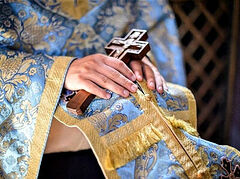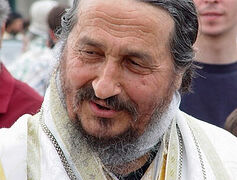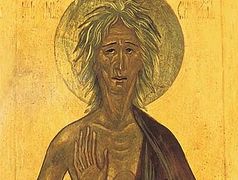Thy conscience and the awareness of thine actions turned thee, O wise in God. Brethren, today is the Fifth and final Sunday of the Lenten Fast. We have completed the course of the Fast in penitence, with acts of charity and virtue. One week prior to the commencement of the Holy Week, the annual commemoration of Christ’s Passion, Crucifixion, Burial and Resurrection, the Church ordained that St. Mary of Egypt should be remembered by the faithful. She was one who, despite living the life of a notorious harlot had conscience and awareness, both of these being virtues which turned her to God. These qualities—conscience and awareness—are almost totally lacking in modern man who cares only of himself and his pleasures and money. They are qualities that were abundant in previous generations who lived in times rife with poverty and plague, but now in our own era of affluence and influence, there is little need of them. Man is his own god, and he lives and cares for himself alone while pretending to be an “activist” in a plethora of social causes combatting the social and moral ills of our era. St. Mary had a serious crisis, which awakened her conscience and awareness. And this is the unfortunate reality of the fallen condition: pain and anguish and torment always lead to slow but consistent spiritual growth, necessary and absolutely indispensable for salvation.
St. Mary was born and raised in Egypt and engaged in prostitution; yet when she travelled to the Holy Land with a group of pilgrims to practice her trade amongst them, she felt an invisible power preventing her from venerating Christ’s Precious Cross in the Holy Sepulcher. It was only when she vowed solemnly to repent, to turn from the ways of evil and sin and to unite herself bodily and spiritually to Christ that she was given the grace to accomplish this veneration. Having gained the grace from the Mother of God, St. Mary condemned all her previous transgressions, and so went with boldness to venerate the Precious Cross. Now, as we approach the solemn days of Christ’s august holy Passion wherein we will venerate His Cross on Holy Thursday evening and Holy Friday, have we also condemned our transgressions, confessing them sincerely in the Sacrament of Confession? Have we profitably spent the days of Great Lent attending the divine services, in prayer, in reading spiritual material which profits the soul, and in watchfulness? If not, let us not despair. The Master is merciful accepting the last as the first, as we will hear on the Paschal night. He sees the intent, and He honours any effort. From the depths of vile sin, St. Mary made such an effort. Could we possibly find the smallest desire to repent—even in these last hours of Great Lent prior to Holy Week—as we turn our spiritual gaze inwardly? Lord, save me, I am perishing! Could we find the slightest ounce of Faith to utter these words from the depths of our heart? It is better to make a beginning now than make no beginning at all. I am of the opinion that the parable of the talents about which we will hear and speak of to greater lengths on Holy Tuesday is iconic of our coming to Christ and our progress in the Christian life. The number of talents are not pivotally important; it is the effort placed into multiplying even the slightest ounce of grace that will be counted towards our salvation.
The Gospel read at today’s Liturgy is not phenomenally connected with the life of St. Mary. Yet, if we place close attention to the meaning of our Lord’s words and the action taken concerning these words by St. Mary, the interior connection between St. Mary’s life of repentance and this particular passage of Holy Scripture will become evident. As the Lord went to His voluntary passion, the Lord warned his disciples to not vie for position and power. The Sons of Zebedee requested such power and honor: to be placed at Christ’s right and left when He would return in glory. The Lord shows them that the path to such glory lies in humility; it is the humble that are rightly called His brethren: Whoever wants to become great among you must be your servant, and whoever wants to be first must be slave of all. For even the Son of Man did not come to be served, but to serve, and to give his life as a ransom for many. These are the last words we will hear from the Lord through the Gospel until Lazarus Saturday, yet they are poignant, they define the essence of Christian life, and they are a compass for us as we approach the coming Holy Week. And they are exemplified in St. Mary’s life. After the awakening of holy repentance and contrition within her soul, St. Mary withdrew to the desert and there, for seventeen whole years battled against the passions and the memories of her vile past. And in doing so she restored the image of God within; that is, the image fallen and muddled by passions and sins which is within each one of us. God is waiting to see Himself reflected in His children. He stands and knocks at the soul’s door. St. Mary neglected her physical comfort and the simple pleasures of life for seventeen years. Could we, this Holy Week, not take two hours of our evening to piously attend the Bridegroom Matins, at which we can watch with Christ but one hour? Are we so incapable and unmotivated to keep vigil in song before the immortal Bridegroom Christ, the desire and ineffable gladness of each Christian soul?
St. Mary embarked upon the journey of repentance in a few short moments of sincere repentance, which inaugurated seventeen years of sanctity. Great Lent, as we emphasized previously, is a time of iconic exile. We are in exile from our true homeland, the Heavenly Kingdom. The act of coming to oneself, of self-recognition, is essential unto salvation. If we are assuming that all is well with our condition and if we are assuming that we had a profitable Great Lent wherein we obtained humility and virtue... this is the very essence of pride. And pride is a “key” passion, in that it leads to other passions, more evident and obvious, such as lust and a host of other iniquities. St. Mary firmly rejected all these when she entered the desert. We will continue to struggle with our passions and failings for the entire duration of our Christian life, that much is certain. The knowledge of this should lead us to humility. Our passions, in fact, are a condition permitted by God in order to create within us a penitential spirit, the heart which is broken and humbled. If we wish to reject pride and arrogance—the same pride and arrogance which Zebedee’s children presented in today’s Gospel and the same pride and arrogance which St. Mary of Egypt conquered—then we must suffer for Him and die with Him in this upcoming Holy Week. We pray and read many things, but I fear that most of us fail to seriously internalize and live by them due to the distractions and cares of this life. Let us cut away at the distractions. In Holy Week we know two roads: one to our work and back, the other to church and back. Let us not deviate from these ways. If we embark on this journey with Christ to Golgotha, we shall hear Him say: No longer do I ascend to the earthly Jerusalem to suffer, but to my Father and your Father, and to my God and your God. May our Lord reward all who sincerely struggle during Passion Week for His glory and the glory of His Holy Church.




